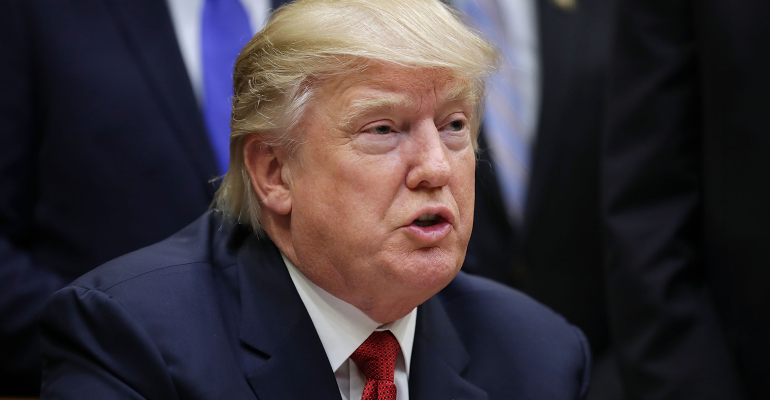(Bloomberg)—Even as he faces impeachment over Ukraine, federal lawsuits claiming that President Donald Trump has unconstitutionally enriched himself continue to dog him. Now two of the suits have reached a crucial juncture.
A pair of U.S. appeals courts this week will consider whether to let the two “emoluments” cases go forward. The plaintiffs argue that the president is financially benefiting from foreign and domestic government officials using his properties. A ruling against Trump could open his business affairs to scrutiny just before the 2020 balloting, after he has spent much of his first term guarding them -- though only if the courts act unusually fast.
“It’s not necessarily too late for these cases to make a difference or have an impact on the election,” said Steven Schwinn, who teaches constitutional law at Chicago’s John Marshall Law School. If one of the appeals courts rules against the president, “I suspect the Supreme Court will have to take it,” Schwinn said.
Certain clauses in the Constitution bar the president from receiving emoluments, or things of value, from other governments. But the legal arguments, on Monday in Washington and on Thursday in Richmond, Virginia, each address a critical preliminary question: Who, if anyone, can hold the president to account in court for any violations of those clauses?
The Washington case was filed by 215 congressional Democrats seeking a court order to make Trump ask Congress for permission to retain any benefits, as they say the Constitution requires. In the Richmond suit, the Democratic attorneys general of Maryland and Washington claim Trump is raking in money at taxpayers’ expense.
Both have been percolating as other Trump cases that are potentially ticketed for U.S. Supreme Court review pose their own threat to the president’s financial privacy. Meanwhile, the Democratic House leadership is drawing up articles of impeachment over Trump’s alleged use of his office for personal political advantage.
In the Richmond case, the two Democratic attorneys general claim the president is “receiving millions of dollars in payments, benefits and other valuable consideration” from both foreign and domestic governments. They point in particular to Washington, where Trump has a luxury hotel just blocks from the White House, drawing away business from D.C. and Maryland restaurants, hotels and convention centers. They want a court order barring Trump from doing so.
The attorneys general, Maryland’s Brian Frosh and Washington’s Karl Racine, won a rehearing by the court’s full complement of judges after the president’s lawyers won a ruling by a three-member panel. Lawyers for Trump disputed that the president’s hotel ownership would send government patronage his way to curry favor. That panel’s members were all named to the bench by Republican presidents, one nominated by Trump himself.
The full court that will hear arguments Thursday will be made up of as many as 16 judges, potentially half appointed by Democratic presidents and half by Republicans.
In the Washington case, a central issue is whether members of Congress, independent of their chambers or Congress as a whole, can haul the president into court. That question will be addressed by a panel of two Republican presidential appointees -- Karen LeCraft Henderson and Thomas Griffith -- and one judge picked by a Democrat, David Tatel.
“I do not buy the broad notion of emoluments,” said Alan Morrison, a constitutional law professor and associate dean of the George Washington University Law School. Morrison last month argued against Trump before the D.C. appeals court on behalf of a Washington restaurateur in an unfair-competition case but didn’t pursue it as an emoluments matter.
Morrison cited the example of President Barack Obama, who entered the White House having published a book. If the crown prince of Saudi Arabia had bought the book, yielding a royalty payment for Obama, Morrison asked, “Would that be an emolument? I think the answer is no.”
A better test, he said, is whether somebody is doing something special for the president. A meal at Trump’s Washington hotel may not qualify, but had the president followed through on plans to host the Group of Seven summit at his Trump National Doral golf resort in Miami, that would have, he said.
Like Morrison, University of Iowa law professor Andy Grewal thinks Congress should legislate the matter, and if not Congress, then its constituents.
“The solution is us,” Grewal said. “If the people don’t want a businessman president, than don’t elect a businessman president.”
Schwinn, of the John Marshall Law School, finds that the plaintiffs “have the better of the argument, on both standing and the definition of emoluments,” and that their challenges to the president got this far because “these issues were carefully vetted below, with good and thorough briefing and well-reasoned opinions.”
That said, the Richmond court “certainly could go in a different direction on either issue,” Schwinn added.
“I hesitate to predict what it will do,” he said, “but if I had to lay money, my guess is that it’ll rule for President Trump, probably on standing.”
The lawsuits will have an impact on the presidency even if their resolution comes too late to affect Trump’s electoral fortunes, Morrison said.
“If the president gets re-elected, they clearly matter,” Morrison said, and if he doesn’t, “they may matter for other presidents.”
To contact the reporter on this story: Andrew Harris in Washington at [email protected].
To contact the editors responsible for this story: David Glovin at [email protected]
Peter Jeffrey, Anthony Lin
© 2019 Bloomberg L.P.





